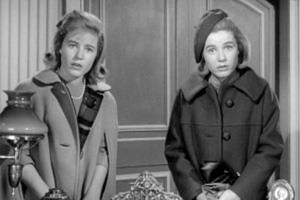It seems that every passing week this year brings word of the passing of yet another great television star of yesterday or not that long ago. Joe Garagiola. Ken Howard. Garry Shandling. Pat Harrington Jr. Dan Haggerty. Abe Vigoda. The Waltons creator Earl Hamner Jr. And now Patty Duke. I’ve enjoyed the work of all of these people and I’m sorry to see them leave us. But the loss of Ms. Duke at a still-youthful 69 makes me especially sad, likely because I am old enough to remember watching and enjoying her ground-breaking sitcom The Patty Duke Show (below) in first-run and perpetual syndication throughout my childhood.
The Patty Duke Show, which ran on ABC from 1963-66, revolved around identical cousins (both played by Duke) who lived together: Patty Lane, the boy-crazy daughter of hardworking newspaperman Martin Lane (the Managing Editor of the fictional New York Daily Chronicle, played by William Schallert) and his wife Natalie (Jean Byron), and the daughter of Martin’s rarely seen brother Kenneth (a foreign correspondent for the Chronicle, also portrayed by Schallert) Cathy Lane, a very cultured and sophisticated teenager who didn’t share any of Patty’s middle-class taste in music or the modern popular culture of the day. The omnipresent laugh track suggested that hilarity ensued. It was rarely that funny, but it always made for a pleasantly amusing half hour.

Anyone who was alive at the time likely feels a distant stirring to get up and dance whenever they hear the iconic theme song from the show. Who can ever forget such lyrics as “Our Patty loves to rock ‘n’ roll, a hot dog makes her lose control?” This show was one of the standouts from an era when so much of television, or at least early primetime, which began at 7:30 and ended at 9 p.m., was targeted directly to kids and families. It still plays on MeTV, where it likely draws an audience of nostalgic viewers 45-plus rather than kids, teens and young adults, who surely look upon it today as a curiosity from one of those other earths that the title character so effortlessly visits on The CW’s The Flash. But for a generation of young people The Patty Duke Show reflected reality, as they knew it, fancied it or wanted it to be.
Today it is nothing less than a cultural artifact. Two years ago I came upon an episode that served as a reminder of the power of “old” or “pre-digital” media; it revolved around a letter to the editor written by one of the main characters and published in the aforementioned New York Daily Chronicle. (The show was set in Brooklyn Heights.) I wrote a column about it that was published here on August 28, 2014.
The Patty Duke Show has true historical significance: It was the first scripted television series to carry the name of a real-life teenager, Duke was the first actor to portray two ongoing lead roles in the same series, and it pioneered the expansion of the special effects needed in every episode to show Patty and Cathy together in the same “frame,” as they often were.
I’m sure the technical crew related to another memorable lyric from the show’s theme song: “You can lose your mind, When cousins are two of a kind!”
Duke made many other distinctive historic contributions to show business. She was the youngest actor ever to win an Academy Award when she was honored in 1962 as Outstanding Supporting Actress for her role as Helen Keller in The Miracle Worker (right, with Anne Bancroft). In 1979 she was honored with an Emmy Award for her portrayal of Keller’s teacher Annie Sullivan in a television remake of that movie. She first played Keller in the Broadway production of The Miracle Worker from 1959-61, and during the run of the play she became the youngest Broadway performer to have her name placed above the title in ads for a show and on the marquee.
She also received Emmys for the television movie My Sweet Charlie (1970) and the miniseries Captain and the Kings (1976) and a guest appearance on the CBS series Touched by an Angel (1999). She received six additional Primetime Emmy Award nominations and one Daytime Emmy Award nomination.
A version of this column was originally published at MediaVillage.